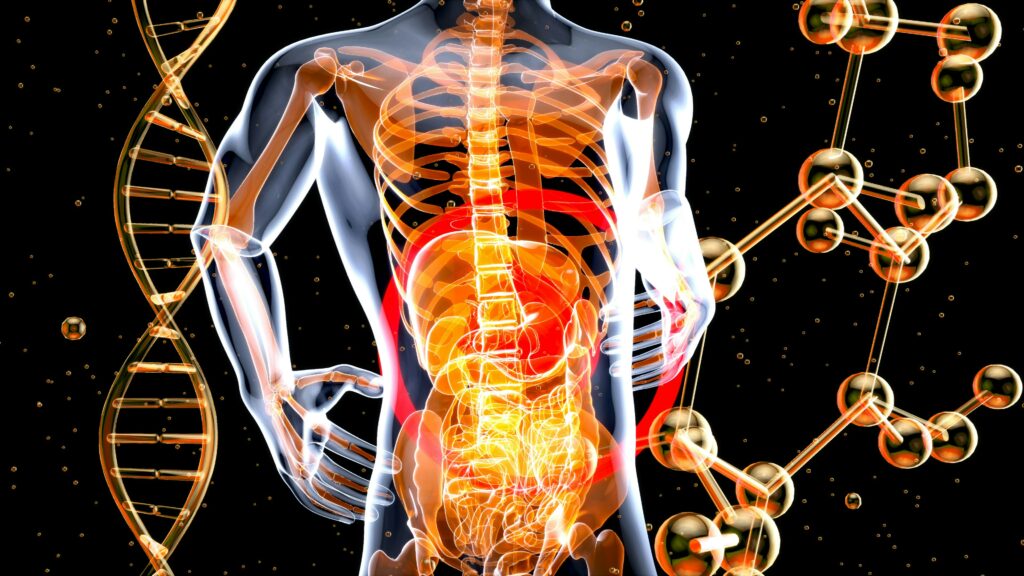Press Release
Revolutionary mechanistic link found between diet, gut microbes and IBD
Breakthrough research unveils key mechanisms of inflammatory bowel disease with therapeutic implications

In a ground-breaking study, the research group of Professor Mahesh Desai, from the Luxembourg Institute of Health, in close collaboration with the research group of Professor Eric Martens from the US University of Michigan Medical School, shed light on the intricate factors that influence Inflammatory Bowel Diseases (IBDs). The new research discovered pioneering molecular mechanisms of IBD pathogenesis that are based on both diet and the microbes in our gut. These new mechanisms outweigh the importance of specific bacterial functions over taxa. The research findings open novel avenues for targeted interventions and treatments for IBD patients.
IBDs encompass conditions like Crohn’s disease and ulcerative colitis, which are manifested with chronic inflammation of the gastrointestinal tract. The current treatment options are expensive and limited in their effectiveness. IBDs affect millions worldwide and present a growing health challenge in industrialized populations due to their complex nature and poorly understood mechanisms of pathogenesis. Although there is a clear genetic component that contributes to the disease, the rising cases in the past years stress the urgent need to identify potential environmental triggers and related mechanisms of pathogenesis. Among these could be altered gut bacterial functions, which necessitate a closer examination of how changing human dietary habits – specifically, the increased consumption of processed foods and the reduced intake of fibre – may be mediating these shifts.
Newly published research by Professor Mahesh Desai, from the Luxembourg Institute of Health (LIH), in close collaboration with the research group of Professor Eric Martens from the US University of Michigan Medical School, identified mechanisms in mouse models detailing how in the face of genetic predisposition, diet and gut microbes play crucial roles in the IBD pathogenesis. The study shows that a fibre-deprived gut microbiota deteriorates the protective mucus lining in the colon and thereby triggers development of IBD in a genetically susceptible host. Interestingly, the research also shows that a fibre-free exclusive enteral nutrition diet reduces the colonic mucus lining, but promotes microbial production of an anti-inflammatory metabolite, isobutyrate, which protects from the disease.
Our work underscores the importance of understanding microbial functions in the context of IBDs and challenges the conventional approaches that focus instead on specific bacterial taxa alone. By unraveling the intricate connections between diet, gut microbiome, and metabolites, we aim to pave the way for more targeted interventions and treatments for IBD patients. Toward this goal, my research group has already recruited IBD patients at the Centre Hospitalier de Luxembourg in order to translate the mechanisms discovered in this study.
explained Prof Desai.
The research was conducted using mouse models lacking the IBD-associated cytokine Interleukin-10, but containing functionally characterized synthetic human gut bacterial communities, so as to identify key immune pathways that drive IBD following increased activities of mucus-eating bacteria.
“These findings open avenues for potential interventions in humans, including optimizing exclusive enteral nutrition formulations and manipulating commensal bacteria to enhance beneficial metabolites,” concludes Prof Desai. “Our research is a foundational step toward the flagship CLINNOVA project led by LIH, which involves IBD as a significant disease. As IBDs persist as global challenges, our research offers valuable insights to advance the understanding and treatment of these complex diseases.”
The study, titled “Opposing diet, microbiome and metabolite mechanisms regulate inflammatory bowel disease in a genetically susceptible host”, was published as a Research Article in the leading journal Cell Host & Microbe. [doi.org/10.1016/j.chom.2024.03.001]
Funding and collaborations
A former postdoctoral researcher from Prof Desai’s team, Dr Marie Boudaud, along with other team members Dr Mathis Wolter, Dr Erica Grant, Alessandro De Sciscio and Stephanie Willieme contributed to the study. The study was funded by the Luxembourg National Research Fund, European Commission and Fulbright Commission in Luxembourg as well as the National Institutes of Health and Kenneth Rainin Foundation in the USA. Several collaborators from University of Michigan Medical School, USA and University of Hanover, Germany contributed to the study.
About the Luxembourg Institute of Health (LIH)
The Luxembourg Institute of Health (LIH) is a public biomedical research organization focused on precision health and invested in becoming a leading reference in Europe for the translation of scientific excellence into meaningful benefits for patients.
LIH places the patient at the heart of all its activities, driven by a collective obligation towards society to use knowledge and technology arising from research on patient derived data to have a direct impact on people’s health. Its dedicated teams of multidisciplinary researchers strive for excellence, generating relevant knowledge linked to immune related diseases and cancer.
The institute embraces collaborations, disruptive technology and process innovation as unique opportunities to improve the application of diagnostics and therapeutics with the long-term goal of preventing disease.
